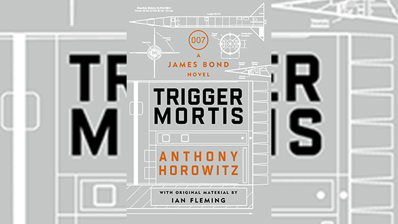Stephanie Jones: Book Review - Trigger Mortis by Anthony Horowitz
- Publish date
- Friday, 11 Sep 2015, 12:28PM

The new 007 novel by Anthony Horowitz, Trigger Mortis, finds James Bond in unreconstructed form. No new-age man, this: he exhibits casual racism and the objectification of women would seem to be part of his daily exercise regimen. In the novel’s acknowledgements Horowitz offers an explanation that reads more like a plea: in trying to stay true to the vision of Ian Fleming, who conceived Bond in the 1950s, he hopes to avoid “upsetting too many modern sensibilities.”
However readers perceive this latest literary Bond, Horowitz did affront many with his remarks to the media about actor Idris Elba being “too street” to replace Daniel Craig as the next screen Bond, and has since apologised. The Bond he presents in Trigger Mortis, conversely, might be one of the least apologetic men who ever lived.
He is by turns irritated by the persistent presence of Pussy Galore in his Chelsea home – they’ve had a delightful few days together in London, but why won’t she leave? – and admiring of the physical attributes of the “jolie-laide” Jeopardy Lane, who has “a behind which [is] small and round, like a child’s”.
Even his secretary, Loelia Ponsonby, doesn’t escape cool appraisal. Aside from being highly competent, she is “strikingly beautiful – he simply could not imagine working with a woman who was plain or unattractive.” Elsewhere, on identifying the Russian accomplices to Jason Sin, the cinematic Korean villain and a prototypical Bond foe, 007 reflects on “the utter cold-bloodedness and contempt that seemed to be built into the Slavic race.” This is not the Bond given life by Craig or, we can imagine, Elba.
The plot proper involves SMERSH, the Soviet anti-spy agency that will be familiar to Fleming fans; a hectic outing on the world’s toughest Grand Prix track, in which the fictional British champion Lancy Smith stands in for Stirling Moss; and the efforts of peace-hating degenerates to co-opt the American space programme and the New York City subway system for their nefarious ends. Horowitz, a prolific writer of novels and screenplays who joins the likes of Sebastian Faulks and William Boyd in writing Bond, knows a fascinating fact when he sees it and weaves into his narrative the story of Operation Bernhard, the secret Nazi plan to destabilize the British economy by printing millions in counterfeit currency.
The psychology of Bond is Trigger Mortis’ linchpin, and on this matter Horowitz brooks no compromise. As he told the Guardian, the most recent Bond film, Skyfall, is his least favourite in the series because of how the protagonist is portrayed: “Bond is weak in it. He has doubts. That’s not Bond.” In Horowitz’s telling, the enemies may have changed since Bond’s pre-World War II childhood, but the moral certainties he formed then remain fixed, and he lives by an immutable moral and philosophical code.
Horowitz’s Bond is the anti-Everyman, a winner and a killer who stands, at the novel’s end, on a rainy London street, another conquest laid out at his feet, pondering the certainty that one day, the dead man will be him. Until then, there are appetites to be indulged and worlds to be saved.
Take your Radio, Podcasts and Music with you

